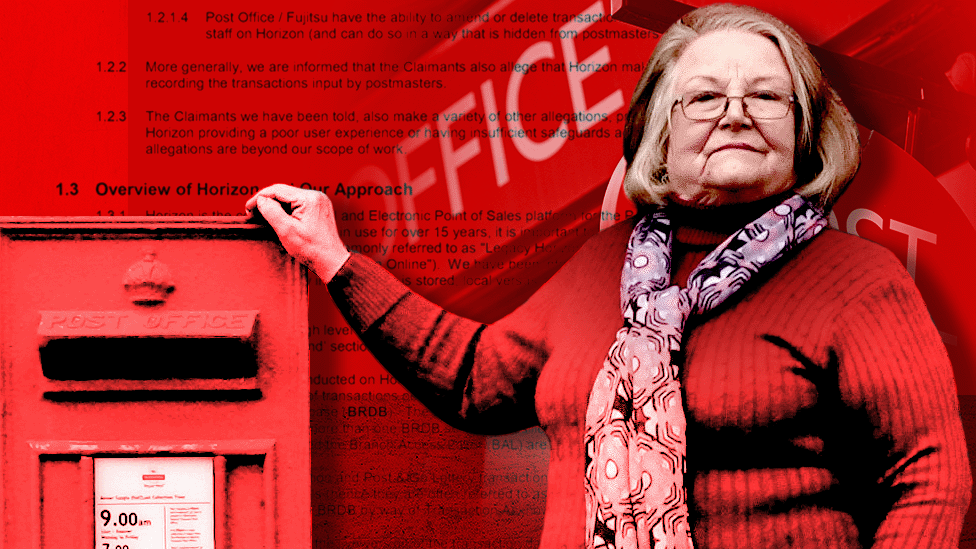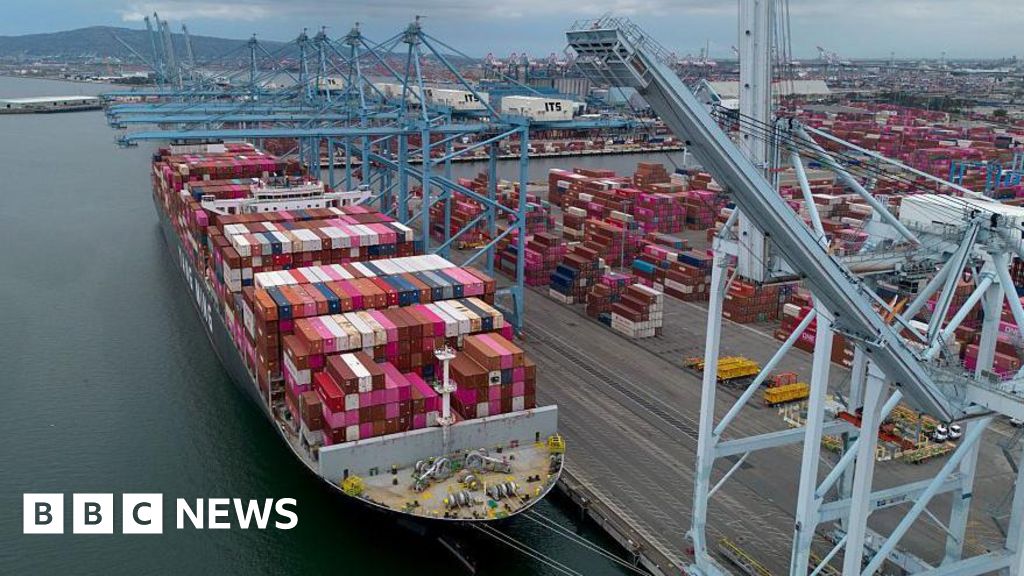ARTICLE AD BOX

Joan Bailey, whose branch is mentioned in the report, said its contents made her "very angry"
By Hannah Price and Tom Beal
BBC News investigations
A draft report uncovered by the BBC shows the Post Office spent £100m fighting sub-postmasters in court despite knowing its defence was untrue.
The document reveals the Post Office was shown evidence by 2017 that losses could be due to errors in the Horizon IT system or remote tampering.
But it kept arguing in the Bates v Post Office Ltd case that theft or mistakes by sub-postmasters must be to blame.
The Post Office said it would be "inappropriate" to comment.
Patrick Green KC, the lead barrister for the sub-postmasters in the Bates case, said the BBC's findings were "absolutely shocking". After reading the report, he added, "I don't think the case should have happened."
Between 1999 and 2015, more than 900 sub-postmasters were wrongly prosecuted due to faults with Horizon, which was developed by the Japanese IT company Fujitsu.
The landmark Bates v Post Office High Court case - portrayed in a recent ITV drama - ran from 2018 to 2019 and was brought by 555 sub-postmasters. They argued that the real cause of their missing cash was not theft but flaws with Horizon or failed attempts by Fujitsu to correct system errors remotely.
The total cost to the Post Office in the legal action was £100m of public money.
Patrick Green KC said the draft report “would have made a huge difference” to the Bates case had it been disclosed
The draft report, titled Bramble, was commissioned by the Post Office in March 2016 and carried out by consultants Deloitte.
Throughout the draft report, Deloitte refers to having already discussed its findings with "Post Office management" and even the fact that some of these were shared with the Post Office's investigators for further analysis.
Tim Parker, the Post Office's chairman at the time of the draft report, also told the BBC via his legal representative that Post Office lawyers liaised with Deloitte about Project Bramble and were responsible for handling, distributing and disclosing it. He added that the Post Office's lawyers were also involved in the "strategy and day to day management of the litigation".
This raises questions as to whether Post Office lawyers met their responsibilities to not mislead the court.
Fujitsu whistleblower Richard Roll had previously revealed the company could remotely alter sub-postmaster's cash accounts.
But Bramble is the first documentary evidence that the Post Office knew Fujitsu staff did this without a sub-postmaster's knowledge - including examples of how often some accounts had been changed.
The draft report also warned that a "malicious actor" at Fujitsu could change, add or delete transactions without leaving a trace.
In July 2017, the Post Office filed a defence document as part of the case. It included some findings from Bramble - in some cases word-for-word - while omitting where they came from and other key elements from the draft report.
Despite what is set out in Bramble, this defence document - which is accompanied by a signed statement of truth - stated that it would be "impossible" for Fujitsu to remotely cause "significant shortfalls".
In the defence, the Post Office conceded that a "small number" of Fujitsu employees had user rights to alter transactions but stated users were strictly controlled.
But in Bramble, Deloitte said it was "impossible" to know which Fujitsu staff had this unrestricted access prior to 2015 because there were no records of who they were or what they did.
Mr Green, who acted for the sub-postmasters, said that in his 34 years as a barrister, he had never seen a defendant proceeding with a huge case and "fighting it very aggressively" in circumstances like this.
Although Bramble specifically looked into the sub-postmasters' claims, the draft report's existence was not disclosed to them or to the court.
Bramble was "exactly the sort of thing that we would have wanted to have and to analyse and put in front of the judge", Mr Green said.
He added: "It's them admitting that they could do in 2017 something they were still denying that they could do in 2019."
The branches examined in Bramble by Deloitte belonged to 91 sub-postmasters involved in the Bates case - including people who had been jailed for theft because of shortfalls.
Joan Bailey and her husband ran a village Post Office in Powys - their branch is mentioned in the draft report. Mrs Bailey estimates that the couple paid over £40,000 to the Post Office to cover losses caused by Horizon.
When the BBC showed Mrs Bailey the report, she said she was "very angry". She added: "This document should have been disclosed years ago. It would have saved myself - and also a lot of other people - a lot of grief and heartache."
Following a request by the BBC, Deloitte's Bramble draft report is now publicly available on the Post Office inquiry website.
In June 2016, Tim Parker, the Post Office's then-chairman, told government ministers he had stopped an investigation into Horizon on legal advice, because of the upcoming court action by postmasters. The existence of that letter from the former chairman was revealed by the BBC last month.
In it, he said the Post Office would "instead address the issues through equivalent work taken forward in the litigation".
Now, the discovery of the draft Bramble report indicates that the investigation into Horizon, originally ordered by the government, actually continued in secret for more than a year, focusing on the branches involved in the case.
In it, Deloitte reviewed Horizon documents, examined transaction data and interviewed Fujitsu and Post Office staff. The purpose was to find out if Horizon was causing sub-postmasters' financial losses.
Deloitte found that while remote tampering by Fujitsu was possible, it would be "a complex procedure" and "likely a 'programme' would have to be written and performed".
In a table, the draft report detailed hundreds of debited transactions entered by "non-branch users", who the report explained "can access branches remotely for support purposes".
In total these debits amounted to £1.3m and were taken from the accounts of 18 branches run by claimants in the Bates v Post Office case.
The report notes that further analysis would need to be carried out to draw "meaningful conclusions", but there is no reference to this ever happening.
The data looked at by Deloitte for the Bramble draft report was from 2010 onwards and its figures are likely to be only a fraction of the true picture.
The BBC's own investigation into this data has found that much of the table relates to transactions which were debited by Post Office auditors, who had been working on the day of, and the days after a sub-postmaster had been suspended. However, the postmaster was still held accountable for any losses in their account until a new sub-postmaster took over.
Fraud investigator Ron Warmington told the BBC that the draft report is "unbelievably damning".
Ron Warmington said accounts were meddled with "on an industrial scale"
Second Sight, the company he worked for, was brought in by the Post Office in 2012 to look into the Post Office's IT and business processes but it was later sacked after the Post Office became worried about the conclusions it was drawing.
This report shows sub-postmasters' accounts were meddled with "on an industrial scale", he said.
The first Horizon criminal convictions were not overturned until April 2021 - and some sub-postmasters are still waiting for their criminal convictions to be overturned.
The Bates v The Post Office Ltd case resulted in the postmasters securing a settlement in 2019 after the judge ruled that the Horizon system contained a number of software bugs.
Because of the huge legal costs of the case that spanned over two years, compensation was reduced to about £20,000 per sub-postmaster - which for many was less than the financial costs they had incurred through having to try to balance their Horizon accounts.
A spokesperson for Mr Parker said that during his time as chair, he had "sought, considered, and acted upon the legal advice he was given" in relation to events related to to the Post Office inquiry, including around disclosure obligations.
The spokesperson said Mr Parker has been asked to provide evidence to the inquiry and was assisting it, adding: "It is not appropriate for him to comment in a way that will impact the work of the inquiry."
Jane MacLeod, the Post Office's general counsel at the time of the case, said she supported the ongoing public inquiry into the Post Office scandal and was assisting it. She added that while the inquiry was ongoing, "I do not think it is appropriate to comment at this time".
In a statement, the Fujitsu Group said it "regards this matter with the utmost seriousness and offers its deepest apologies to the sub-postmasters and their families". It added that its UK subsidiary was providing full co-operation to the inquiry and will be working with the UK government on "appropriate actions, including contribution to compensation".
A Post Office spokesperson said: "We are deeply sorry for the impact of the Horizon IT Scandal on so many people's lives and continue to pay redress to victims as swiftly as possible, with £179m paid to around 2,800 Postmasters to date.
"Alongside financial redress for victims, there must also be accountability. The best forum to achieve this is the statutory public inquiry, chaired by a judge with the power to question witnesses under oath. The next phases of the inquiry will examine the issues raised here and it would be inappropriate to comment outside of that process."

 1 year ago
49
1 year ago
49








 English (US) ·
English (US) ·